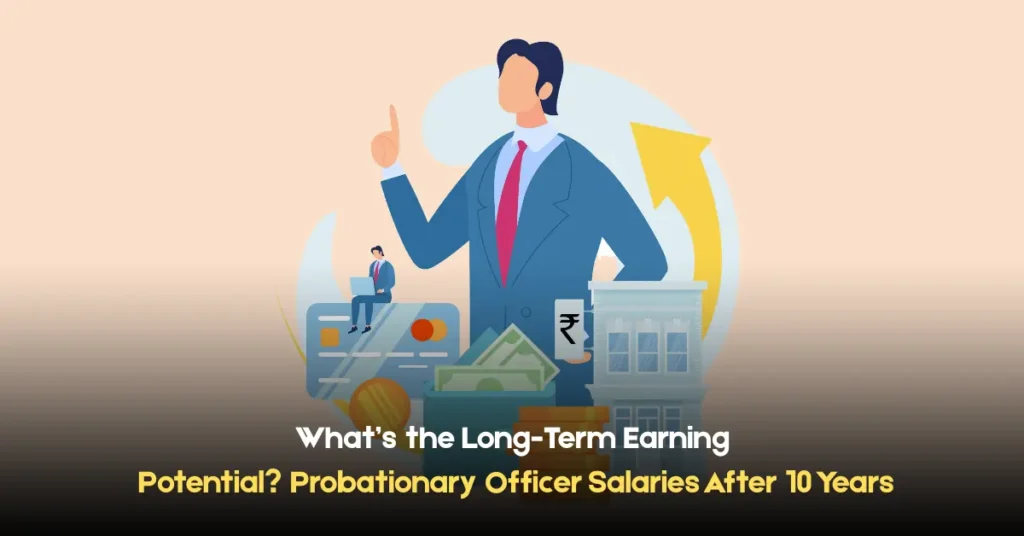Have you ever wondered how a banking career progresses financially over time? A probationary officer (PO) position is often considered a gateway to a rewarding future, but what does the salary look like a decade later? Understanding long-term earnings can help in making an informed decision.
The SBI PO salary after 10 years sees considerable growth due to periodic increments, promotions, and additional benefits. Compensation is not limited to basic pay—it includes allowances, bonuses, and other financial perks. Over time, a PO transitions into higher roles with improved financial stability, making it a sought-after career option.
Salary Growth Over the Years
A PO’s salary structure follows a clear progression path. Initial pay includes a base salary combined with dearness allowance, house rent allowance, and other benefits. After five years, employees experience multiple increments, leading to a noticeable rise in take-home earnings. By the 10-year mark, the salary increases significantly due to promotions and periodic revisions in pay scales.
Apart from the fixed salary, performance-based bonuses contribute to overall earnings. With consistent career progression, officers reach mid-level managerial positions, further enhancing their financial standing. Over time, salary revisions and government regulations also influence earnings, ensuring that employees receive competitive pay adjustments.
Impact of Promotions on Salary
A probationary officer does not remain in the same role throughout their career. After a few years, officers become eligible for promotions, moving to positions such as Assistant Manager, Deputy Manager, and beyond. Each promotion brings an increase in basic pay and additional benefits.
Higher responsibilities come with revised pay structures, and those who clear internal examinations or excel in performance reviews may experience faster career advancement. The SBI PO salary after 10 years reflects these advancements, often surpassing initial expectations. Promotions also impact job responsibilities, with managerial roles offering greater allowances and incentives.
Additional Perks and Allowances
Salary growth is not just about base pay. Over time, officers receive various allowances, such as dearness allowance, house rent allowance, and city compensatory allowance. These components increase periodically, contributing to an improved financial package.
Other benefits include leased housing, medical coverage, leave travel concession, and pension plans. These additions significantly enhance long-term financial security. Furthermore, performance incentives and annual bonuses further supplement the overall income, making banking a lucrative career choice.
The Role of Annual Increments
Annual increments play a vital role in salary progression. Every year, a probationary officer’s basic pay increases based on predefined scales. Additionally, revised pay structures introduced through government policies can further boost earnings. Regular salary revisions ensure that officers remain financially stable throughout their tenure.
By the 10th year, cumulative increments result in a noticeable difference in overall compensation, reinforcing job stability and long-term financial growth. Even in economic downturns, structured pay revisions provide security, making this career path resilient. Additional contributions to pension funds and post-retirement benefits further secure an officer’s financial future.
Long-Term Career Growth and Financial Stability
A decade into a banking career, a PO transitions into managerial roles that offer higher salaries and additional responsibilities. With experience and industry knowledge, officers gain access to specialized roles such as credit analysis, risk management, and treasury operations, further increasing earning potential.
The structured nature of salary increments, combined with ongoing professional development, ensures that officers continue to experience steady financial growth. Additional perks, including stock options and participation in financial policy planning, enhance career prospects, making banking a long-term stable profession.
The SBI PO salary after 10 years is not just about numbers—it represents financial stability, career growth, and a secure future. As officers gain experience, they move into leadership roles that offer higher earnings and better benefits. The long-term career path in banking ensures consistent salary increments, comprehensive allowances, and professional development opportunities. With these advantages, a PO can build a rewarding and financially secure career that continues to evolve with time.
